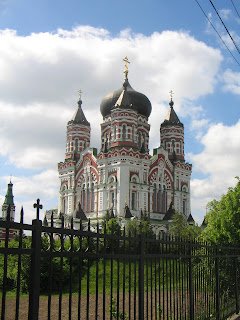It was a bitterly cold day in October, the day we got married in Ukraine.
To be fair, it was sunny. Much better than the foggy, rainy day prior. It would have helped too if our wedding wasn’t at nine a.m., but it was the only spot left at the marriage palace in my wife’s home city of Zaporizhzhia (I’ll use the Ukrainian pronunciation even though almost everyone from this Russian-speaking part of the country would call it Zaporozhye).
For almost the entire day, a kind woman spoke English into my ear so I could understand what was going on. Currently the head of a non-profit organization operating in Zaporizhzhia, she has fled with her husband to Romania. From there she continues to direct operations remotely to keep in contact with the parents of children with disabilities.
Our wedding day was filled with tours and photographs and then much eating. It must have been some combination of the food, emotions and perhaps champagne that did me in.
The next morning, I couldn’t move out of bed without the room tilting to one side... and then to the other. It was the beginning of a traveler’s sickness that would incapacitate me for the next five days. Let’s just say that many home remedies were applied.
Once recovered, our honeymoon could begin in earnest. After travelling by train through the night – no time is wasted in Ukraine – we met our friends in Kyiv. (The train station we left from was bombed last week, a 25-minute walk from where my wife used to live.)
Once in Kyiv, we were immediately fed and taken care of. My wife’s friends had a newborn at the time who, similar to me, was suffering from gastro-intestinal issues. Another home remedy was successfully applied.
Their daughter is now nineteen and will hopefully be joining us in Canada next month to work and possibly study. She was only two months away from completing her computer graphics degree in Kyiv before the war broke out.
Her family built a house in a suburb southwest of Kyiv, a beautiful town with parks and forest nearby. The last time we visited in 2009, they cooked us shish kebab the Ukrainian way – simmering over a fire in the woods.
As far as we know, their suburb has not been bombed, but to the north and south there have been strikes and fierce fighting. The Russians are attempting to infiltrate the city through the northwest. Because of their lack of progress, many fear they will resort to indiscriminate missile attacks.
Back in 2002, we toured the museum commemorating the victory of the U.S.S.R. over Nazi Germany (the irony of Russian accusations of neo-Nazism in Ukraine is not lost). It made me realize how important this piece of history is to Ukrainians and Russians alike. The German occupiers were reviled, beaten back into submission after years of occupation. We also saw the “Peoples’ Friendship Arch,” a monument to commemorate cooperation between Russia and Ukraine. Again, the irony.
The likelihood of us going to Ukraine in the near future is low; if anything, our friends and family will be coming to Canada. It can’t be soon enough for us, but many feel an obligation to remain; to not leave their husbands who are now part of a war, or to not leave their jobs. Many in Ukraine, like my sister-in-law and husband, still show up to work every day to keep what’s left of the economy going.
They are keeping a watchful eye out for Russian “saboteurs” who are taking videos of landmarks in their town. They are hiding in the nearest basement each time an air raid siren goes off. They are attempting to carry on with regular activities, despite the fact that Russian forces are 30 kilometres south of them across the Dnieper River.
This is life in Ukraine, a beautiful country now being destroyed. They are a resilient people, but so undeserving of these atrocities.





